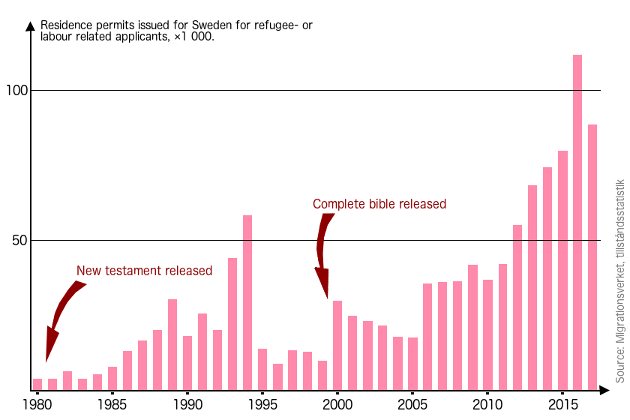Will you, dear reader, excuse another vain post about this wretched country?
There are elections upcoming scheduled 9 September (2018) and the all-eclipsing issue is migration. The two largest parties used to be Socialdemokraterna (the Socialists) and the Moderates (moderate socialists). These two parties have led one political bloc each, and have taken turns accepting more and more immigrants into the 10-million-inhabitant state, against some fierce popular resistance.
Now as it happens, Socialdemokraterna is also the party which has the most influence over the church which was until year 2000 run by the government, and which has, for a legacy, more than half the population as members. Year 2000 is also the year when a government commission released a bible paraphrase which was intended to become the “leading bible-text for the Swedish language area”. It is called Bibel2000.
One of its many features is it renders MT: גר/ LXX: προσήλυτος as ‘immigrant’, in Swedish ‘invandrare’.
A consequence is it becomes hard for Christians to argue in favour of a more restrictive migration policy, since the burden of loving the גר/προήλυτος as commanded in Torah is substantial, and whereas Christians aren’t bound by the law, it teaches them the principles and reasoning of God, so it cannot really be ignored.

The word ‘immigrant’ is rare in bible translations. Perhaps this is because the Christian’s perspective is global, which means that the prefix im- in ‘immigrant’ usually doesn’t make sense.
However the similar prefix shows up in the latin word advena, used a lot by Jerome in these places. Where the Old Latin version can be recreated from patristic and other authors who quoted it, ‘proselytus’ shows up in nine passages and ‘advena’ in six, in Sabatier’s edition.
Among the words in Greek that corresponds the best to ‘migrant’ would be μετανάστης ‘refugee’ and πάροικος ‘exile’, as Moses described himself while he lived in Midian (Exodus 2:22). Παροικία as a noun was used too to describe that which the Israelites were subject to when they were forced to migrate to Babylon and later encouraged to return (Ezra 8:35).
As גר ger has a related verb גור gur, meaning ‘to sojourn’/’to tarry’, it would not be farfetched to think that a ger could be a traveller of some sort. There exist many sorts of travellers, for example a stateless nation who live in the Nordic countries are called “The Travellers”, there are travelling salesmen, doctors, refugees, missionaries, proselytes and pilgrims, to mention but a few. Translating גר by ‘migrants’ or ‘immigrants’ risk excluding these groups from the hospitality that the law seems to demand for their sake.
In contrast, the Divine Liturgy of St Chrysostom’s tradition reads:
Ὑπὲρ πλεόντων, ὁδοιπορούντων, νοσούντων, καμνόντων, αἰχμαλώτων καὶ τῆς σωτηρίας αὐτῶν, τοῦ κυρίου δεηθῶμεν.
For seafaring [men], wanderers, ill, sick, captives and their salvation, let us pray to the Lord.
The mass-migration that fashion Europe of today has led to some forms of travelling getting harder. There are biometric passports, border controls, digital video surveillance, face recognition, more crime, more policemen, DNA-profiling, bodily searches and all sorts of anti-terror measures that weren’t needed back when Europe was mostly democratic.
So, in summary, somebody is probably very proud right now for having fooled most Swedish Christians by simply rewriting their holy scriptures. And it is dire.
